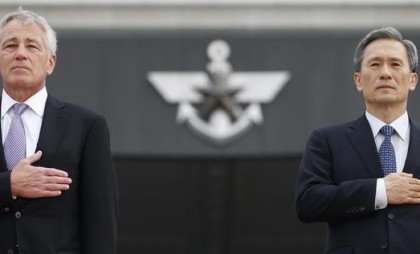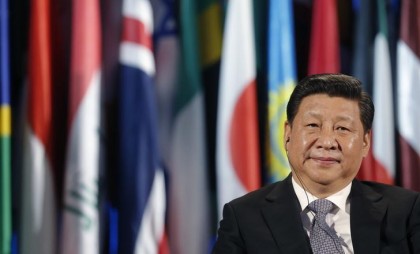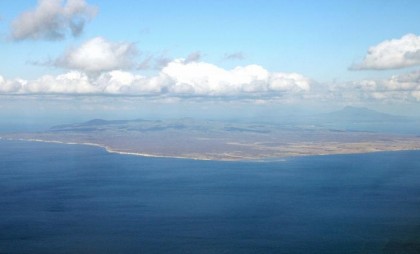I appreciate the opportunity to offer commentary on Bong Youngshik’s excellent article. His chronology and analysis of the mutual mistrust between the ROK and Japan, particularly under the Abe administration, are very close to my own observations, albeit that I look more closely at the Japanese position, given that Japan was the primary focus of my diplomatic career and is the center of my academic research. From that perspective, I do believe that the article understates the sense of disappointment and frustration among Japanese at what is seen as the increased politicization of history and territorial issues by recent South Korean leaders and the Korean press, but I will leave that issue to commentators from Japan. Instead, I would like to comment on two US-related issues raised in the article.
First, I am very cautious about suggestions that the United States actively intervene to mediate Japan-ROK relations. It is true that we have a strong interest in a cooperative relationship between our two key allies in East Asia, both of whom share many of our strategic, political, and economic interests, but I believe an active US role would risk straining our relations with both countries and be unlikely to improve the situation. Moreover, the US view on Japan-Korean issues is mixed and complex. On the territorial dispute, like almost all such third-country disputes, we take no position, and we have no security obligation to either side. On history issues, the “comfort women” problem is the only element that resonates broadly in American society, particularly because of its relationship to the dignity of women and current concerns about human trafficking. On Japan’s colonial rule itself, the US position is more ambiguous. Japan’s occupation of Korea was not part of the list of major pre-war American grievances with Japan; indeed some (but not all) historians argue that the United States was complicit in this occupation by virtue of the 1905 Taft-Katsura Memorandum of Conversation that appeared to trade US acceptance of Japan’s control of Korea for Japan’s recognition of American control of the Philippines. Since the end of the war, the United States has not intervened in the substance of the issues raised by the colonial period, and I do not think we should begin now. This would not preclude the United States from playing a quiet background role, as in the establishment of the “German Fund for the Future,” to assist Japan and the ROK in setting up a public-private partnership to reimburse victims of forced labor, an idea recently put forward by Stanford’s Daniel Sneider. However, our primary role should continue to be to urge both sides to deal with whatever issues remain from this period in a manner that does not undermine the opportunities for cooperation on the broad range of interests that the ROK and Japan, and the United States, share.
Second, I want to comment on the suggestion that Prime Minister Abe’s more active defense policy poses a threat to the ROK. I fully understand Korean sensitivities on this issue, but I think the changes that the government of Japan is considering need to be kept in perspective. Reinterpreting the constitution to allow Japan to exercise the right of collective self-defense has been on the agenda for years, both in the context of Japan’s increasing role in international peace keeping and in providing more support to the US-Japan alliance. The Yanai Commission, which is deliberating the issue, is scheduled to issue a report in a few months with recommendations. From my perspective, this is a legitimate issue for Japan to consider. The UN Charter authorizes collective self-defense and calls on members to contribute to collective security; there is no reason that Japan should not play a more active role in this area. Indeed, it may open opportunities for Japan-ROK collaboration on peacekeeping operations (PKO). With respect to the US-Japan alliance, any recommendations by the Yanai Commission that allow American and Japanese forces to work together more effectively, including on missile defense, are, in my view, supportive of regional stability and security and, therefore, should also be in the interest of the ROK.
With respect to Japan’s forthcoming Defense Program Outline that sets forth Japan’s mid-term defense objectives, I believe there are elements that are of legitimate interest and potential concern to the ROK. According to the interim report issued in July, as part of Japan’s efforts to enhance its missile defense system, the government plans to study the acquisition of “strike capability,” presumably to give Japan the potential to take out a North Korean missile site that may be about to launch toward Japan. I believe that such a decision is one for Japan to make; indeed, last year the ROK decided to extend the range of its own medium range missiles. However, acquiring strike capability could be seen as a departure from Japan’s “defense only” postwar posture, and raises question about its intent and about how it will be coordinated with interested parties, including the United States and the ROK. If this recommendation is included in the final report, Japan and the ROK should engage in full and candid consultations to ensure that it is implemented in a manner that is not contrary to ROK interests.
Given the evolving situation in the region and shifting global balances of power and influence, it is natural, in my view, that Japan enhance its defense capabilities. There is no indication that these enhanced capabilities will be used outside the framework of international cooperation (PKO) or the US-Japan alliance. The Japan of the 21st century is not the Japan of the early 20th century. The best way to ensure that ROK interests are taken into account is to expand the dialogue on security issues between Japanese and South Korean military and civilian officials and political leaders. Both sides need to make continuing efforts to reach a better understanding of the colonial period, but allowing disagreements about the past to block a dialogue about the future is in no one’s interest.






